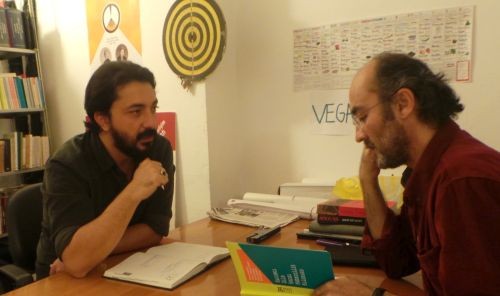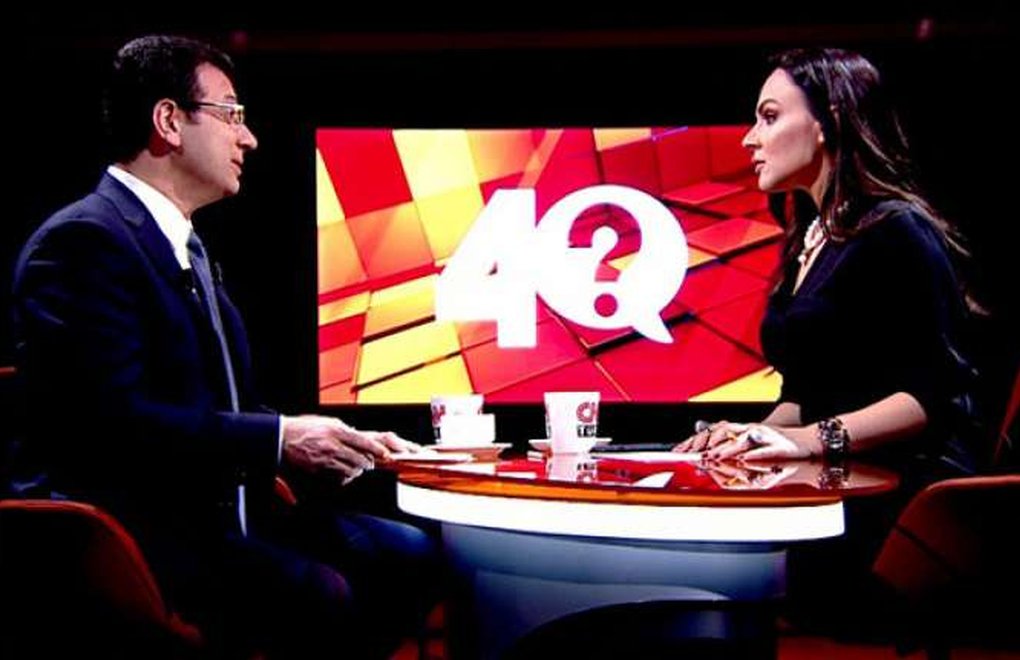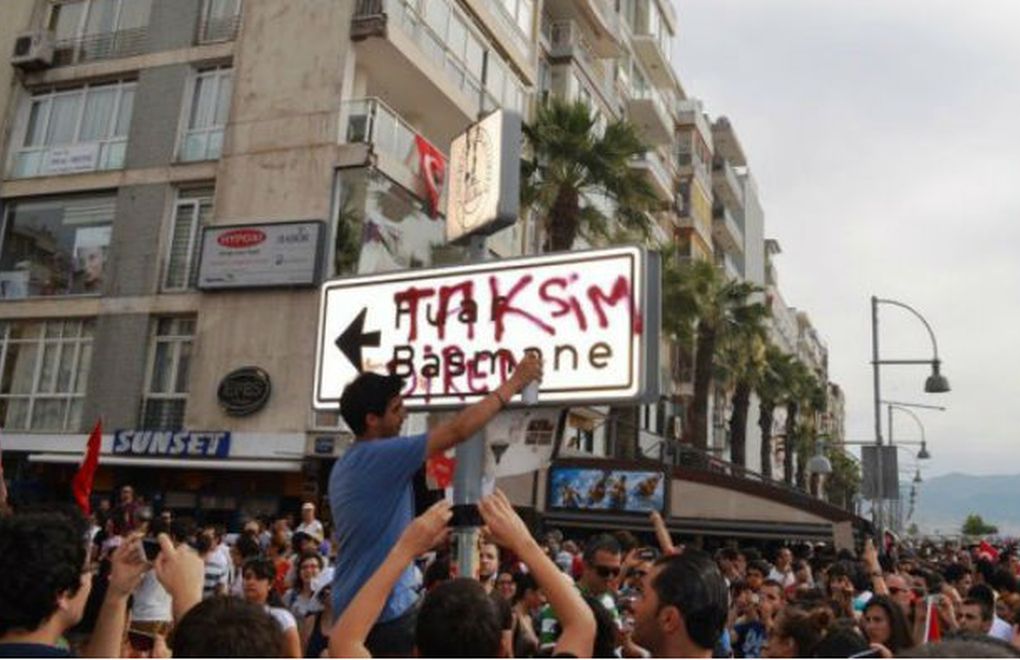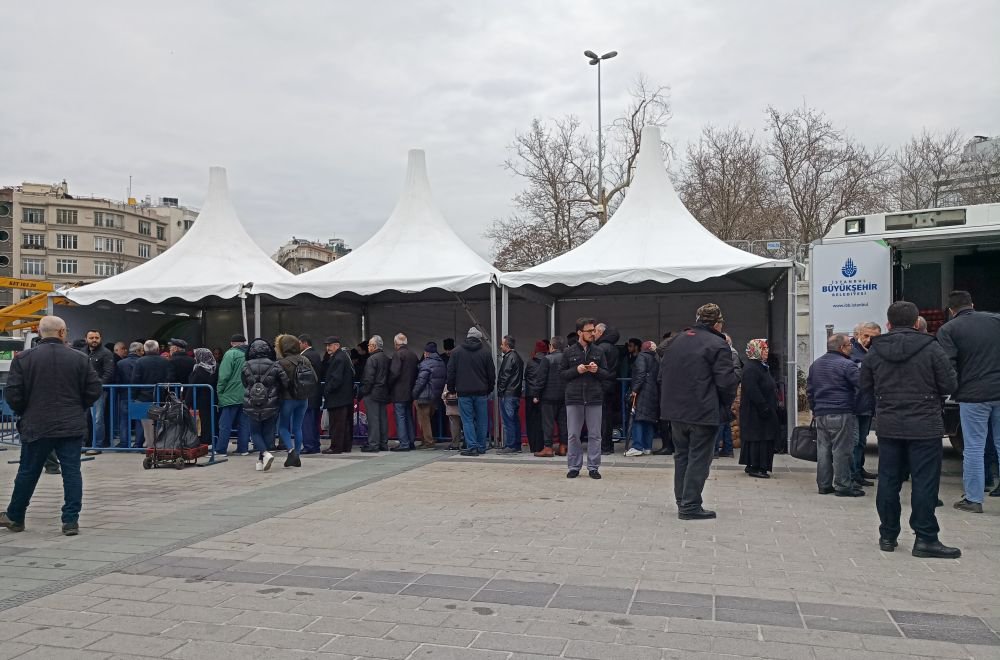Click here to read the article in Turkish / Haberin Türkçesi için buraya tıklayın.
”70 Years old but not played out”. This was a headline on Sözcü daily on March 26, 2014.
This report is a typical example for the discriminatory language of media. The subject of this report is Nebahat Çehre’s intense work schedule. Although there are all possible sorts of alternative headlines for the report, this discriminatory cliche has been chosen. “First of all it is a sexist expression. ‘Not played out’ connotates that Nebahat Çehre ‘has not gotten ugly though her age’. This headline implies that ‘under normal circumstances one should be played out with age 70’.”
Mahmut Çınar, Yonca Poyraz Doğan, Tayfun Ertan and Rana Şenol are the developers of the book. We had a talk with Mahmut Çınar about this project which confirms the discriminatory language of media with examples, proceeds with questions of what must be and should not be done in accordance with these examples and develops a journalism guide and a little lexicon.

How has the project idea arisen?
As my study titled “Hate Speech in Media” was published by Hrant Dink Foundation, journalist Yonca Poyraz Doğan has interviewed me, and mentioned that “Media Ethics Platform” had a project idea regarding this issue yet have not been able to systematize it. I had the idea of doing a study like what they have mentioned for a while myself and we have shared our ideas with each other, came to an agreement and have built this guide project with Media Ethics Platform. Subsequently Punto 24 Independent Journalism Platform has supported us, and we have brought this project to live with under the sponsorship of Friedrich Neumann Foundation.
What kind of a study have you carried out?
Not an academic study, more of a practical guide so to say.
In that case a more journalists-oriented study…
Our primary target group is journalists of course, yet we have strived at making it suitable for communication faculty students, academicians and everybody who are interested in this topic. As it wasn’t an academical study, we have not applied a strict methodology, yet we needed to have a rich collection newspaper cuttings. Therefore we have agreed on the months of February, March and April for 2014 and concentrated on six newspapers; Hürriyet, Sabah, Sözcü, Yeni Akit, Zaman and Yeniçağ.
According to which criteria have you determined on these newspapers?
We have made a point of their suitability to represent different cultural and ideological sections. Because we are aware that discrimination is not an issue for only a specific part of media and think that it spreads over all media.
But it must have spread to different extents...right?
Of course it has. Our daily language is already discriminatory plus there is somehow an influence regardless to which ideology of journalism practice you stand up for. This journalism practice unfortunately has been using certain common and stereotypical expressions from past to present. We can come upon discriminatory language even within media formations which aim at being out of this picture.
Our secondary criteria has been the quantity, meaning that the chosen newspapers were able to reach enough readership which was quantitatively suitable to represent different cultural and ideological sections.
Another criteria was preliminary researches which enabled us to confirm that such discriminatory expressions had been used on these newspapers before. Newspapers specified by five fellow students have been watched for a period of three months. We had prepared a form and according to the instructions specified on the form, certain newspaper cuttings have been picked out and documented.
In addition to this, we have also benefitted from other researches done before, meaning that the reports published in these three months were not our single source. For instance, we have also used studies of NGOs which work on this field such as “Media Watch on Hate Speech” project run by Hrant Dink Foundation, “I Demand Hate Crimes Legislation Project” of the Association for Social Change (ASC), “Women’s Media Watch Index” of Women’s Media Watch Group (MEDİZ) and of course studies of KAOS-GL (Kaos Gay and Lesbian Cultural Researches and Solidarity Association). Besides we have also used other academical and semi-academical studies.
Have you approached to the theoretical framework on the basis of these report examples?
We do not believe in the necessity of redictating journalists didactically what to do and what not to do in a patronizing manner and repeating very basic ethical principles like not using a discriminatory language for not violating human rights. We even observe that some basic ethical principles do not turn out to be very effective due to circumstances. Even in Turkey, we have many declarations and ethical codes; from ethical principles of the “Turkish Journalists Association” to those of the “Press Council” and to the very own publication principles of media corporations. Yet these are unfortunately not always of use.
Do they set out principles because it is a must, yet they are not adapted in practice?
Yes, media corporations set out these principles in the manner of meeting their responsibilities but the problem is the fact that these are very universal principles. For instance, they do dictate not to impose sexism yet in practice the journalist decides oneself what is and is not sexism. Besides many journalists may legitimize what they do in that sense and can defend themselves claiming not to have discriminated or violated one’s individual rights. In Turkey this is a very common situation in media.
And in the world? How is the situation outside Turkey?
In every place in the world the situation is more or less the same. There are two separate reasons; once we have the example of the U.S. where the media is almost untouchable. In the U.S., we can come upon a great number of reports and columns reaching up to be an insult or an assault.
Do they perform this according to the freedom of expression?
Yes, this is judged according to 1st Article of their Constitution under the freedom of expression.
The situation is a bit different in Europe. There we can observe that obstructions and reglements were tried to be made and yet that most of the time these regulations do not address to the media. In other words, also there media corporations reproduce hate speech and that discrimination is very common in daily language. In this field we have learned academically much from our American and European colleagues. They have done many researches on such an area as they impose hate speech and discrimination obviously. Yet we can’t say that these academic and semi-academic studies have accomplished big success. Yet of course there are some media corporations which have achieved to stay clean to some extent, in this sense BBC would be the best example regarding implementation of publishing principles and ethical codes because BBC tries to set out a very detailed case-based journalism principle contrary to what is much common in the rest of the world. That is why the publishing principles of BBC are much variable and flexible as ethic actually includes a dynamism in itself. One has to decide taking each single situation into account. Yet in crisis situations like during occupation of Iraq, we had to add many minus points to BBC’s record which has been more positive till that time.
That is just what I wanted to ask. There is a struggle against discriminatory language and we can acknowledge that some progress has been made with be it with bigger or smaller steps. Yet at some point a big crisis occurs and everything is forgotten again. For instance the language of the media has suddenly changed after June 7 general election.
Offensive, antagonizing and hateful expressions rise during crisis periods, an exaggerated increase is observable. A well-known example, soon after and right before April 24, a rise in the number of negative reports and columns about Armenians are observed in Turkey. Or like you have mentioned, in times of war and thus nationalist delirium times media revives its hate speech and antagonizing expressions as a bigot reaction since it is in its genes.
Back to the study, during your watch period of three months, which areas have you mostly come upon? Which fields are the most problematical?
Like we have expected, mostly sexism was the issue. Reports including negative and degrading or ignorant expressions against women and identity of women were predominant and this is not a surprise. I personally have a high opinion of this sentence: On the expressive basis of discrimination, it is generally possible to detect a maleness. In other words, we can see that the discourse which insults and considers women a secondary gender in every way and on every occasion and negates women’s struggle for equality, is used also in other categories. While discriminating on the basis of ethnic background, religion, physical appearance and age, people use concepts which they have learned through the masculine language. Actually gender inequality expands over all categories and in my opinion this is the most important category. Sexist reports against women are therefore predominant. We have also observed various discriminatory discourses on the basis of ethnicity, religion and race. It’s used to be said that there is no racism in Turkey. No, there is, even to a large extent, deeply ingrained to the bone. It used to exist for a long time as a state policy and still is. From national anthem to the definition of nation, from our national oath which has been abrogated recently to political discourses, we can find traces of monotyping racist connotation. Every kind of nationalism embodies an “other”, there is no meaningful definition of nationalism without an “other”, which is an ontological necessity.Every opinion which contains an “other” in itself, be it intensely or mildly, or embodies it in its political manifestation, inholds latent or explicit racism.
Well, is there any issue which is missing or was not given enough attention to?
It is actually difficult to not find any newspaper cuttings and reports on many obvious discrimination categories. Yet there are also unnoticed and latent discriminations, against persons with disabilities for instance. There is the category of discrimination on the basis of age which is not a very emphasized issue in Turkey but a main category in the West or class-based discrimination as well as discrimination on the basis of mental disability to which is also not dwelled upon. When a criminal case is being reported and a mental issue in the biography of the committer is suddenly highlighted, this is a discrimination. We have not been able to find many examples in such fields, yet this should not be considered a positive state because representations rates in the media are very low which is also a discrimination. In every fifth or sixth report among a thousand, one can come upon a content about persons with disabilities yet among none of these five or six reports with a positive connotation which is a serious neglect and ignorance. These persons have representations on special days yet we know that Turkey is not a disabled-friendly state. We are talking about a large proportion of the society who has to stay home as public space is not regulated suitably for use by persons with disabilities. Approximately 10% of the population consist of persons with disabilities yet they are made invisible and have almost no representation in the media.
We are aware of the discrimination of foreigners. Can the refugee issue which has expanded due to the Syrian civil war in the recent years have let a new situation emerge?
Of course, illegal immigrant is a widely used term and in my opinion it has gone beyond xenophobia. The fact that a person is obliged to find asylum causes to produce a new identity for this person beyond the identity as foreigner. Besides racist discrimination against persons who have immigrated from Syria in the recent years, there is also the cliche of economic criticism, namely the typical sentence of “they work for cheap and take our jobs”. Also the religion-based discrimination within is interesting as some of the immigrants are Turkmens yet they are exposed to discrimination under the title of Syrians despite the state produced discourse of common-ancestors which has been cultivated for years. I am talking of a mentality of considering Azerbaijanis, Uighurs and other turkic elements from far Asia the same as oneself. When considered from this point of view, I am of the opinion that this should be considered a different category from now on.
Back to the discrimination on the basis of age. This is also a new field for Turkey.
When talking about discrimination on the basis of age, we instantly think about an aged person. Discrimination of aged persons of course comprises a large part yet the exact definition is the discrimination of a person because of age regardless which age the person is. It is approaching children, young, middle-aged and old persons as stereotypes and aged persons are mostly the target.
What is “senile”? Would this be an example?
Yes, there are many common stereotypes like “one foot in the grave”, “senile”, “grumpy old man”, “old people are ugly, they can’t learn, remember, are useless, a burden for the society, easy to convince and trick, don’t have a sexaul life and those who have one are perverts...and the list goes on. As the population in Turkey is younger in relation to the West, the awareness on this issue has run behind.
Accessibility for aged people is a treated issue in the West, like for persons with disabilities but in Turkey this is not considered a problematic field. Within our studies, we have also given coverage to this issue.
Maybe we have landed on the same point like at the beginning of our conversation; ethical codes should be flexible for dynamics and transition. Discrimination on the basis of age has created a new topic of discussion. In this sense a new question: This study must be reproduced and renovated in accordance with the definition of ethic, when will you repeat the study?
As we have decided on the systematic and methodology of the book, we knew more or less what kind of discriminations there were, to which extent and in which categories in the media in Turkey. From this point of view, we can say the context of the book has caught a good representativity. But like you have mentioned, ethic must be adapted due to circumstances yet this does not mean that principles also have to change. Discrimination on the basis of age, which has not been an issue in Turkey till today, is now a one. In the future, we may be obliged to create a new field or we come upon to cases to such an extent that the examples of discrimination we have mentioned here turn out to be innocent...In such a case, we will have to review or redo the study. (HK/DG)












